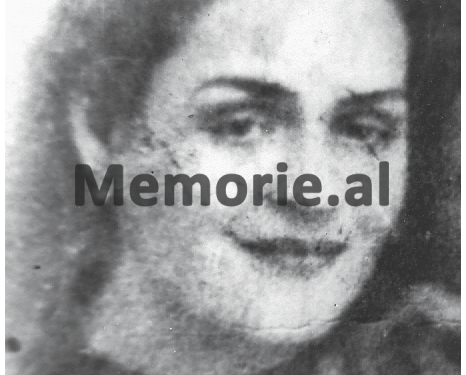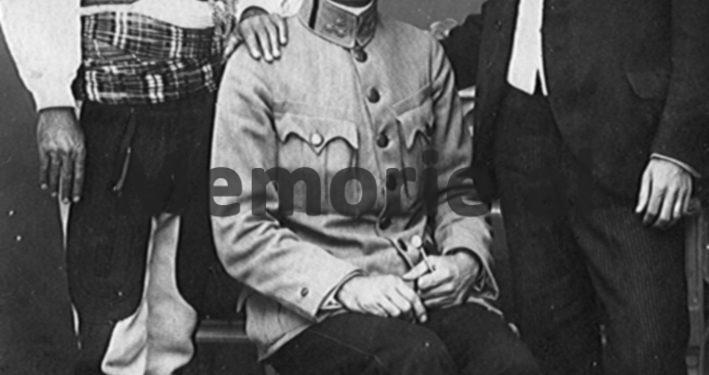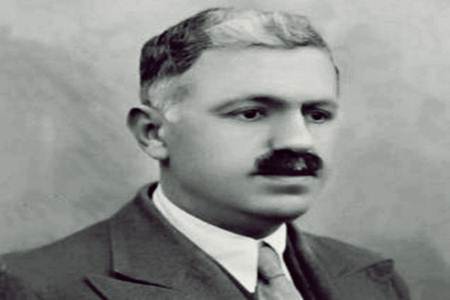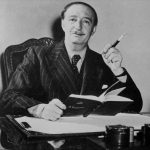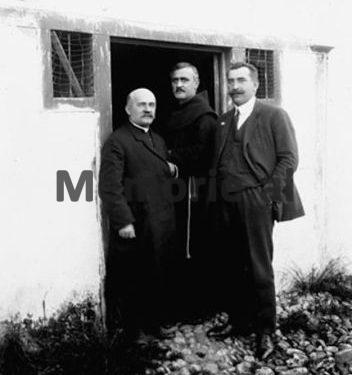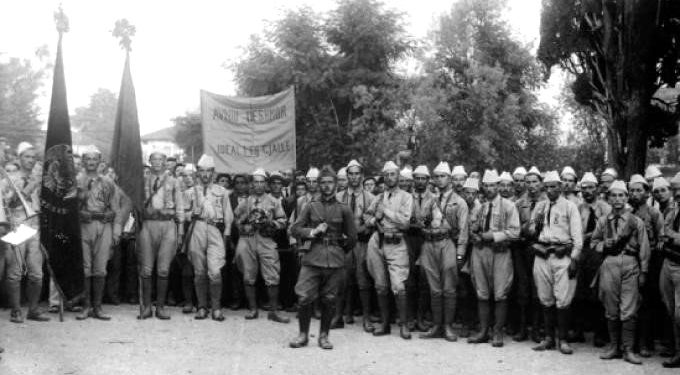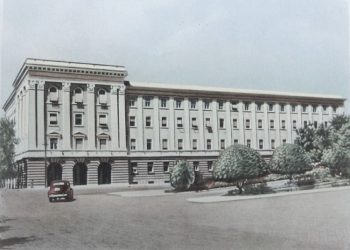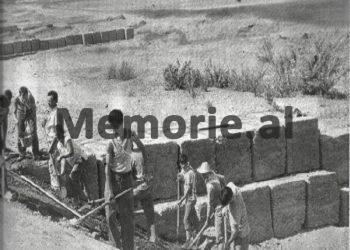By Ledia Lleshi
Memorie.al / The Gjylbegu family, originally from Shkodra, has been settled in Elbasan for years. Part of the Gjylbegas tribe, this family suffered the consequences of communism after the liberation. Everything has been very difficult for Hamid, who in his formation and patriotic efforts, a close friend of Avni Rustemi, did not accept the establishment of the dictatorship. Even openly, he refused to vote during the entire period of communism, he refused neither electrification nor television and until he died, he spent his life in complete silence and rejection of communist ideas. Then his story was followed by his son, Virtyti, who at a very young age, while participating in a popular communist trial, reacted, breaking the silence of that false trial and for this, he was sentenced to 5 years of imprisonment.
The story is passed on to us by Bardhyli, the Bio-Chemistry teacher, who as a child tried his hand at communism and saw how Virtyti was arrested in the “Nacional” cinema. This family with traditions and even with property and a lot of wealth, ended up in poverty and in great difficulties of survival.
Bardhyl Gjylbegu ranked himself among those people who, immersed in suffering and persecution, not only managed to survive, but became an example of work and knowledge for all others. An excellent student, but not supported, his name could not be listed among the school’s exemplary ones.
His family was defined as declassified and for many years, he was not given a front door. His uncle, Hamid Gjylbegu, a military academic and poet, was imprisoned and exposed as a determined anti-communist. He was one of the rare Albanians who refused to vote during the dictatorship, while Virtyti, his 22-year-old son, was shot in the infamous Maliqi camp.
Bardhyl’s mother had a hard time providing food for the three orphans. When all the children were relaxing in the summer, 12-year-old Bardhi could be found working as a manual laborer in the olive groves, and the difficulties for the family were not over. His older brother, Luani, had the courage to ask the question in class “Why do the Chinese fight in Korea?”.
They kicked him out of school as an enemy of popular power, accusing him of dividing anti-government tracts. Bardhi himself graduated with honors from the “Normal” school and was appointed a teacher in the most remote villages of Skrapar.
As they take him as a soldier, only the labor departments would be ready for him, but he did not surrender. In addition to the military service, he finished the University of Tirana in the Faculty of Biology-Chemistry, with an admirable average for the difficult period he was going through 8.3., but the teacher who had graduated from high school, ended up in the deep villages of Librazhdi.
He manages to show his talent in teaching, when in 1973, in a national competition for biology, representing the district of Librazhdi with students from the village, he left several big cities behind in the classification, among them Elbasan. But Gjylbeg’s dedicated work would be rewarded with a layoff, for political reasons, in 1975.
The principal of the school, a fanatical blind communist, “spun” the excellent teacher with the absurd accusation; “It does not distinguish the plant world from the animal world.” As a result, Bardhi is sentenced to 15 years of hard work in construction, while his wife, 4 years of manual labor and then left unemployed for 12 years. For years they kept their breath with minimal financial income and only with the advent of democracy, this family was able to enjoy a little of the missing freedom.
The passionate teacher was appointed to the “Dhaskal Todhri” gymnasium, where he served with the same zeal and dedication, until he retired. A veteran of education, Sefedin Trugu, described teacher Gjylbegu as an example of love for education. “With people like Bardhi, who are not few in our city, ‘Normalja’ and our national education should be proud”, he said, among other things.
Suffering and contempt
(Memories of Bardhyl Gjylbeg, for the first years after the war)
It was the first days of November 1944. I, a 5-year-old boy, stood in amazement at the big gate of the house and looked at the road. German officers and soldiers rushed into our house…!
My 3-year-old sister and I, wearing an old but clean dress, headed to the “Aqif Pasha” garden just 11 meters below our house. This school, where there was also a kindergarten named after the prominent patriot from Elbasan, changed its name and after a few years it became the 7-year school “Ptolome Xhuvani”.
We knocked on the slightly open door, where we could hear the loud voices of the children. The educator Marije Llulla came out, a beautiful woman, the wife of an Italian soldier from Trieste, with a soft voice she asked us: “What are you looking for?”
We told him in a low voice our desire, to learn in the garden, as if caught in guilt. She caressed us both and continued with her sweet voice: “I can’t accept you, because there is no place…”! We left bowed and in tears, we returned home. When our parents saw us, they asked us: “What do you have?”
We told them everything. In reality, the terrible class war was taking place, which continued on us even more mercilessly. When it started on small children that we did not understand why and who was our fault!
Not knowing what was happening, I went back to the garden, but now I didn’t dare to knock on the door. I listened attentively from inside the door, the teacher’s words mixed with the children’s voices and cries. It was a great joy for me when it happened to shoot that the door did not close completely and was a little open as it was well heard.
One day one of the children, a little girl with yellow hair, saw me behind the door and asked me: “Why are you staying here?” I told him in a low voice my desire to learn in kindergarten. Without waiting, the little girl disappeared inside the room, where the voices of her peers were buzzing, and after a while the teacher showed her at the door. Scared with tears in my eyes, I waited…!
She compassionately, after hearing my great desire to learn, took me into the room, caressing me. I sat down, stopped crying, wiped my eyes with my little hands and listened. From time to time, I looked at the walls, seeing for the first time colorful figures, various incomprehensible sights, and it seemed to me that I had entered the world of fairy tales!
Virtut Gjylbegu, defended the intellectuals in the trials at the “National” cinema
Fear ran through the city, as the trials against “class enemies”, as the anti-communists were called, had begun. A rampant propaganda terrorized the people. The trials were held in the “National” cinema, built by the patriot Xhavit Biçaku, which was filled to the brim with people, who, bombarded by communist propaganda, in the majority, as in chorus and in ecstasy, shouted: “Criminals on the rope”, ” Death to traitors”!
At one of these trials in the autumn-September period of 1946, the cinema hall resounded with the animalistic howls of the crowd, which screamed as loud as it could. Me and 5-6 7-year-old children, we were moving restlessly on the street in front of the cinema. We didn’t understand what was happening, but we felt that something bad was brewing…! In the hall and exactly in one of the lodges opposite, our Virtute was also sitting.
The trial was held against the most prominent intellectuals of the city, from the Fagu, Maçi, Gurmani, Ceka, etc. families, the cream of the Elbasan intelligentsia. These people of science, knowledge and education were faced with illiterate prosecutors and judges, newly descended from the mountains. The words were barely audible.
People filling the hall with fear in their hearts, anxiously waiting for whatever happened, waiting for the punishment of the innocent. No one dared to speak, but no…! A powerful voice boomed from the lodge in front of the stage. It was the strong, indomitable voice of the 21-year-old Virtut that brought the mask to this farcical trial. He appeared fearlessly in the defense of the accused, as a powerful lawyer, in defense of the truth, which they wanted to distort.
At a time when everyone was afraid, a brave man like him, a hero, came out fearlessly in defense of the ideals of freedom. Everyone turned their heads from this brave man who was challenging the communist dictatorship, which was being installed in Albania. Many knew Virtue, which, as its name implies, was the personification of the highest moral virtues, intelligence and courage.
He was the excellent normalist, appearing on the stage of the city’s history, in defense of truth, freedom of speech and justice. The prosecutors, the judges, were stunned for a moment, and so were the people who filled the hall. They expected no opposition, in that atmosphere of Jacobin terror.
How did they gather themselves, they ordered the police to handcuff him on the spot, they handcuffed a young man, just for free speech and immediately sentenced him to 5 years of heavy prison and sequestration of property. The shocking news spread quickly in Elbasan families. One can imagine the horror and horror that engulfed our family. We cried non-stop. The mother cried for the only son, the sisters for the adored brother and we three little orphan children, who sat in silence as if frozen with tearful eyes, we cried for the uncle, the pillar of the house, that we had as protection.
Who would support us now? Who would feed us? Where would we lean? Our family was left without a grown man, with three shocked women and three small children, seeking protection, seeking to live. The prison and the cell where our Virtue was confined was inside the city’s castle, along with other prisoners. Trembling, every day I entered the gate of the castle and headed towards the prison with fear, to send him some food that the family could prepare. From Elbasan they were taken prisoners to the infamous camp of Vloçisht, for drying the Maliq marsh.
From Ndriçim Plangarica, our neighbor and close friend of Virtut, we learned the truth of his tragedy. This truth is written in Plangarica’s book “The Last Circle of the Red Hell”, pg. 190. Virtuti had worked to dry the swamp of Maliq. In addition to heavy destructive work, leeches, which were attached to their bodies, when they worked submerged in water, in addition to special tortures, mistreatment, humiliation and beatings, the prisoners treated them like animals, even shooting them with guns.
In these terrible conditions of the camp, Virtuti was smiling and loving with all the prisoners. This did not please the leaders of the prison, who could not forget the challenge of Virtut in the trial that took place in Elbasan, where his courage and bravery echoed everywhere. They charged the guards for humiliating him. They accused him of taking food from a fellow prisoner. For this, he had to be punished…!
After the prisoners had eaten their breakfast, the piece of stale bread without sugar, they were lined up in the square in front of the camp barracks. Two guards took Virtyt by force and tied him to an electric pole. In this pillar, the prisoners had to pass in turn and spit on it. Those who did not, were forced to repeat it. When this animal communist rite ended, the guards and guards started the prisoner to work.
All the time at work, Virtuti did not speak. When he returned to the camp, he did not respond, even when the appeal was made. He didn’t eat the stinky lunch soup. In his spare time, he spoke to no one, but sat in front of the sleeping quarters, looking at the barbed wire that surrounded the camp, at the side of the watchtower in front of him. He didn’t even eat his dinner soup. After midnight, in the prisoners’ dormitory, a loud voice was heard: “Stop, Stop, Stop”!
After the call, a burst of machine-gun fire was heard and bullets grazed the boy’s body. All the prisoners knew the bitter truth…! The fence with barbed wire, you couldn’t pass without leaving your head there. Virtuti had not tried to escape, but with full awareness, went to end his life. Touching the last frontier, of communist hell.
He passed away, gaining eternal freedom. Thus ended the life of an innocent young man, talented in many fields, turning into a memory that remained alive in our minds and hearts. Elbasan owes it to honor this indomitable brave, only 21 years old, who openly challenged the communist regime in its beginnings.
The dismissal of Bardhyl Gjylbeg!
According to the anti-constitutional law of the communist dictatorship, teachers whose parents were sentenced by the communist regime in power, by firing squad or other severe punishments, were fired from their jobs in all districts of the country. In my case, these persecutors also violated this infamous law. I am fired, because my uncle was sentenced to political prison.
My father, Sait Gjylbegu, was killed in 1942 as a result of revenge, completely innocent, and my mother raised us three orphaned children under the age of 5, with heavy physical work, on the farm in the olive grove. In my file it was written: “His uncle has been sentenced to political prison”, while the ignorant director of the school adds: “You don’t distinguish the plant world from the animal world”?!, when I had finished brilliantly and when I asked: “Why was the law violated?” “? They answered by gnashing their teeth;
“The Party knows that. That you are from a family of owners; your mother doesn’t have a front trisk”, and other communist slogans. Although I had earned the “Gold Medal” for graduating from the Higher Institute, they forced me, together with my wife, to perform heavy physical work for 15 years in a row, with all the moral, economic, and political consequences of this work. forced, like in concentration camps, but without wires.
Letter to Enver Hoxha: “Liberation was made by great people”
-Hamid Gjylbegu, refused the votes and electricity-
Hamid Gjylbegu was born in 1887 in Shkodër, in a family with traditions, among the oldest. Patriotism was the most valuable legacy of this family. Hamid’s father was wounded in 1835, after taking part in the defense of the lands and also serving in the national uprisings of 1911-1912. Hamidi completed his secondary studies in Thessaloniki and his higher education at the military high school in Istanbul.
He later specialized in the military academy in Berlin and after completing this specialization, he was appointed to the Turkish General Staff in Istanbul. After the declaration of independence in November 1912, he refused a large salary and stipends and left for Shkodra, together with Hoxha Kadri, in 1913. A major officer in the national army is appointed there. In 1914, as a unit commander, he ensured the arrival of Prince Vid.
Afterwards, he serves as the battalion commander of the Albanian national army, in Elbasan, with the rank of captain. With his unit, in the years 1913, he took over the protection of the International Commission for the determination of borders. Being well versed in German, French, Italian, new and old Turkish as well as Persian, he is appointed a member of this commission and helps facilitate communication between the members of the International Commission.
In the Congress of Lushnja, the unit that led, takes this national gathering under its protection. In August-July 1920, when Serbian forces attacked Koplik, Hamid was appointed commander of this front. Although in unequal power ratios and in the minority, he crowned this battle with victory. Both a nationalist and a democrat, he supported the June Revolution of Noli and, starting from this, in the days before the Monarchy, he resigned from his military career.
However, his political opponent Ahmet Zogu recognized the merits of the diligent soldier, Major Gjylbegu, by awarding him a decent state pension. In the occupation of Albania by Nazi-fascism, he is asked to return to military life, and he is even offered the rank of general, but he maintained the same attitude, as once the High Gate proposed to make him military commander in Lebanon, again answered.
But even though he maintained his figure and had a bright career in defense of the homeland, in 1946, when the communist regime had just been installed in Albania, he along with his two cousins, Gjyl and Qamil Gjylbegu, were arrested on the charge of participation in the Postriba uprising and are isolated in the “Red Gestapo” of Shkodra. Hamid suffered the most inhumane torture inflicted by the communist executioners, but he did not give up.
The investigation against him lasted for a year and then he was released for lack of evidence. For the second time, he challenges the dictatorship, severing all ties with the state. She imprisons herself at home, cuts off the electricity supply to the house, resolutely boycotts every vote, both for the elections for the People’s Assembly and for the local government. So poor to the point of destitution, without a pension, under the light of the lamp, he spends the darkest days and years of communism.
The consequences of the communist revenge would fall precisely on his son Virtytin, who was killed in prison, in Maliqi’s Swamp Camp. On the 50th anniversary of independence, in 1962, Hamid Gjylbegu addressed a letter to the dictator Enver Hoxha, where he said, among other things: “You don’t have national liberation, but social liberation. Albania has not been liberated, the liberation you mention was achieved by some greater men than you”…!
Hamid Gjylbegu was also a man of letters. He has published 17 books, mostly poems, some of which are in the Library of Elbasan. There are pieces, essays, poems of a philosophical character, the study of which would reveal another side of this man with national values.
He was friends with Ismail Qemali, Bjaram Curri, Luigj Gurakuqi, and especially with Avni Rustemi, with whom there is also a photo. He also had friendships with Fishta, Mjeda, Dom Ndre Zadeja, etc.Hamid Gjylbegu, the outstanding patriot who fought with arms in hand for the protection of the territorial integrity of Albania, after the communist persecution, died in complete solitude, in 1979, at the age of 92. Memorie.al




